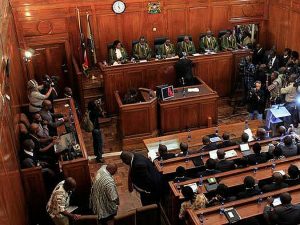I am sure you must have heard the word Bail before. Even if you are yet to hear the word or must have heard it without knowing it’s meaning, this write-up is going to give you a comprehensive detail of what you should know about bail in Nigeria.

What is bail?
In the case of Onyebuchi v FRN & ORS (2007) LPELR- 4135 (CA) the Court defined Bail as the process by which an accused person is temporarily released from state custody to sureties on conditions given to ensure his attendance in Court whenever he is required until the determination of the case against him. In another words, Bail is the security in form of cash or bond required by a Court for the release of a prisoner who is to appear in Court at a future date.
Also see: Punishment for stealing in Nigeria
Two (2) Types of bail in Nigeria
There are two major types of Bail namely, Police Bail and Court Bail.
1. Police Bail: Police Bail is also known as administrative Bail. It is usually obtained by a person suspected of committing a crime, but the police or investigating agency are yet to obtain enough evidence to charge such person to court.
For example, if I am arrested for killing someone, and the police after two days is yet to find concrete evidence to institute an action against me in Court for the commission of Murder, the police will grant me Bail. That’s what is called Police Bail. It is usually granted because of the Constitutional provision that it is unlawful to detain a person in the police station for 24 hours or maximum of 48 hours without charging the person to court.

Police Bail is free. However in Nigeria police officers often use it as a medium to exhort suspects and make them pay huge sum of money before they can be released from the Police station.
Also see: How to answer law problem questions using IRAC method
2. Court Bail: This is a Bail granted by the court. It can either be Bail pending trial or Bail pending appeal.
A. Bail pending trial: This is a Bail granted by the trial Court pursuant to the statue creating the Offence charged, while such a person charged is either to be tried in Court, is awaiting trial or during their trial.((Ojo & Anor v FRN (2006) LPELR – 5423 (CA))
An example of Bail pending trial is where John is arrested and charged to Court for the offence of armed robbery. Upon application of John, Bail may be granted to him by the Court while he is still waiting to be tried, or even during the course of his trial. This will ensure that John rather than stay in the Police station, will be coming to Court from his house or the house of his surety.
Bail pending trial is founded on the principle that a person is innocent until proved guilty by the Court. Thus, anytime before the Judgement of a trial Court is given, John may be granted Bail to move freely but must comply with the Statutory requirement for Bail pending trial.

B. Bail pending Appeal: This arises where after the judgment of the trial Court, John is found guilty and sentenced to prison. John now appeals against the decision of the Court to Convict him and he also applies to the Court to grant him Bail pending the determination of his Appeal.
Though Bail pending Appeal is usually difficult to get considering the fact that the presumption of your innocence to the offence alleged no longer exists, but as stated in the case of Abubakar v State (2013) LPELR – 22188 (CA) a Bail pending appeal may be granted by the Court if the Applicant has lodged an appeal to the Court of Appeal which is pending, if the Applicant was granted Bail at trial and he did not attempt to jump Bail, if the hearing of the Appeal is likely to be delayed and if the Applicant can prove the Special or Exceptional circumstances to be granted Bail.

Also see: Differences between Cross-offers and counter-offers
Statutory Requirements for Granting Bail in Nigeria
Generally, Section 158 ACJA 2015 provides that: “When a person who is suspected to have committed an offence or is accused of an offence is arrested or detained, or appears or is brought before a court, he shall, subject to the provisions of this Part, be entitled to bail.”
Let’s consider these Statutory provisions and requirement which the Court will consider before granting you Bail with respect to the Offence you have been charged with.
Capital Offence: A Capital Offence is an offence punishable by death penalty. Thus, where you are charged with a Capital offence, you must fulfill the statutory requirement in Section 161 ACJA 2015 before you can be granted Bail.
Section 161 ACJA 2015 provides as follows:
161(1) A suspect arrested, detained or charged with an offence punishable with death shall only be admitted to bail by a Judge of the High Court, under exceptional circumstances.
161(2) For the purpose of exercise of discretion in subsection (1) of this section, “exceptional circumstance” includes:
(a) ill health of the applicant which shall be confirmed and certified by a qualified medical practitioner employed in a Government hospital, provided that the suspect is able to prove that there are no medical facilities to take care of his illness by the authority detaining him;
(b) extraordinary delay in the investigation, arraignment and prosecution for a period exceeding one year; or
(c) any other circumstances that the Judge may, in the particular facts of the case, consider exceptional.
Without your prove of these exceptional circumstances, you are not entitled to Bail.

Offence exceeding three years:
You are entitled to bail when you are charged with an Offence exceeding three years imprisonment as punishment provided that you fulfill the statutory requirements in Section 162 ACJA 2015.
Section 162 provides as follows:
A defendant charged with an offence punishable with imprisonment for a term exceeding three years shall, on application to the court, be released on bail except in any of the following circumstances:
(a) where there is reasonable ground to believe that the defendant will, where released on bail, commit another offence;
(b) attempt to evade his trial;
(c) attempt to influence, interfere with, intimidate witnesses, and or interfere in the investigation of the case;
(d) attempt to conceal or destroy evidence;
(e) prejudice the proper investigation of the offence; or
(f) undermine or jeopardize the objectives or the purpose or the functioning of the criminal justice administration, including the bail system.
Offence not exceeding three years imprisonment:
Section 163 ACJA 2015 provides that where you are charged with an offence not exceeding three years imprisonment as penalty, you are entitled to Bail unless the court sees reasons to the contrary.

Also see: Differences between Cross-offers and counter-offers in contract law
Conditions for Granting bail in Nigeria
Section 165 of the Administration of Criminal Act (ACJA 2015) lays down the conditions of the Court to grant Bail.
These conditions are:
(1) Bail in any case shall be at the discretion of the court with due regard to the circumstances of the case and shall not be excessive.
(2) The court may require the deposit of a sum of money or other security as the court may specify from the defendant or his surety before the bail is approved.
(3) The money or security deposited shall be returned to the defendant or his surety or sureties, as the case may be, at the conclusion of the trial or on an application by the surety to the court to discharge his recognizance.
Also see: General defences in criminal law
In Conclusion, every Nigerian must know that Bail is their right, but it’s not an absolute Right as it is subject to your fulfillment of the aforementioned Statutory requirement and Conditions for the Court to grant you Bail. However, where you fulfill these requirements and the Court fails to grant you Bail, it’s your right to appeal against the decision of the Court refusing you Bail.

Tochukwu Anayo-Enechukwu is a Law Graduate of the University of Nigeria Nsukka and an Internationally certified Writer. He has worked with numerous writing companies within and outside Nigeria, and has recently established his own Writing brand specialized in satisfying the Writing needs of International students and clients. He enjoys Writing and Researching and is open to collaborative projects and Gigs. You may contact him via: [email protected] or 08109493399.
I am very satisfied with your work, your work is very important and beneficial to me and any other law student.
Excellent article
I am very impressed with your work